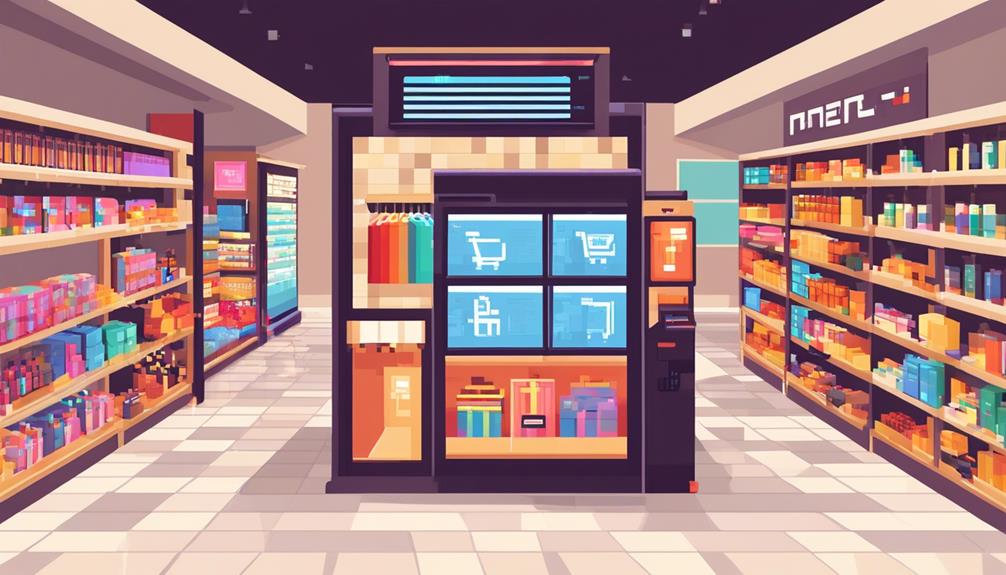As retailers strive to stay competitive in the rapidly evolving landscape of the retail industry, implementing IoT technology has become a key strategy for success.
However, the successful implementation of IoT in retail heavily relies on careful consideration of hardware aspects. This includes selecting the right IoT devices and sensors that can collect and transmit relevant data.
From temperature sensors that monitor product conditions to proximity sensors that detect customers and trigger personalized promotions, the hardware choices made by retailers can greatly impact their ability to enhance supply chain management, automate routine tasks, and gain valuable insights for intelligent decision-making.
Furthermore, the selection of an appropriate IoT cloud platform for managing networks and analyzing data is crucial.
In this discussion, we will explore the various hardware aspects that retailers need to consider when implementing IoT in retail and how these choices can drive success in an increasingly competitive industry.
Key Takeaways
- IoT hardware components such as sensors, gateways, and RFID tags provide unprecedented visibility and control over supply chain and store operations.
- RFID technology enables real-time tracking and monitoring of stock levels, reducing manual errors and improving efficiency in inventory management.
- IoT-enabled solutions facilitate seamless communication between retailers and suppliers, allowing for timely reordering and a smooth supply chain flow.
- Personalized shopping experiences based on IoT technology enhance customer satisfaction, loyalty, and engagement by tailoring offers and promotions based on customer data.
IoT Infrastructure Hardware
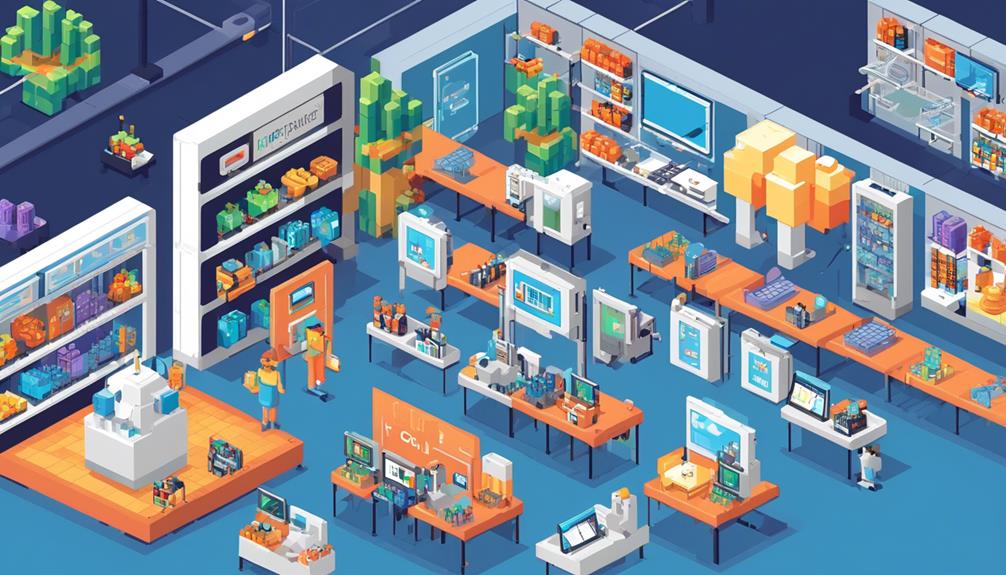
The hardware components of IoT infrastructure, including sensors, gateways, RFID tags, and smart shelves, play a vital role in enabling data collection, communication, and processing in retail environments. These smart devices have revolutionized the retail sector by providing retailers with unprecedented visibility and control over their supply chain and store operations.
Sensors are at the heart of IoT technologies in retail. They are embedded in various devices, such as shelves, shopping carts, and even clothing racks, to gather real-time data on customer behavior, inventory levels, and environmental conditions. This data is then transmitted to gateways, which act as intermediaries between IoT devices and the cloud. Gateways ensure seamless connectivity and enable the transfer of data to the appropriate software applications for analysis.
RFID tags are another crucial component of IoT infrastructure in retail. These small, wireless devices enable real-time tracking of products throughout the supply chain. By attaching RFID tags to individual items or product packaging, store owners can monitor inventory levels, reduce stockouts, and streamline the replenishment process. This automated inventory management system ensures accurate stock counts and enhances operational efficiency.
Smart shelves are also gaining traction in the retail industry. Equipped with weight sensors and RFID technology, these shelves can automatically detect when a product is removed or restocked. This real-time inventory information enables store owners to optimize shelf space, prevent out-of-stock situations, and improve the overall customer experience.
Inventory Management Solutions
Implementing efficient inventory management solutions is crucial for retailers to track product levels, automate reordering processes, and enhance stock accuracy and supply chain operations. With the rise of IoT technology, retailers can now leverage hardware aspects to improve their inventory management systems.
Here are three key aspects of implementing IoT in inventory management solutions:
- RFID Technology: Retailers can use RFID chips to tag their products, enabling real-time tracking and monitoring of stock levels. These chips can be scanned by IoT sensors placed throughout the store, providing accurate and up-to-date information on inventory. By automating the process, retailers can reduce manual errors and improve efficiency in managing stock levels.
- Streamlined Supply Chain Management: IoT-enabled inventory management solutions facilitate seamless communication between retailers and suppliers. By integrating IoT sensors in transportation vehicles and warehouses, retailers can monitor the movement of goods in real-time. This allows for timely reordering, reducing stockouts and ensuring a smooth supply chain flow.
- Retail Software Development: Retailers can develop custom software applications that integrate with their IoT inventory management solutions. This software can provide insights into stock levels, sales trends, and customer demands. By analyzing this data, retailers can make informed decisions regarding inventory replenishment and optimize their stock levels to minimize waste and costs.
While these IoT-enabled solutions offer numerous benefits to retailers, it is essential to address data security concerns. Retailers must implement robust cybersecurity measures to protect sensitive customer and inventory data from potential breaches.
Personalized Shopping Experiences
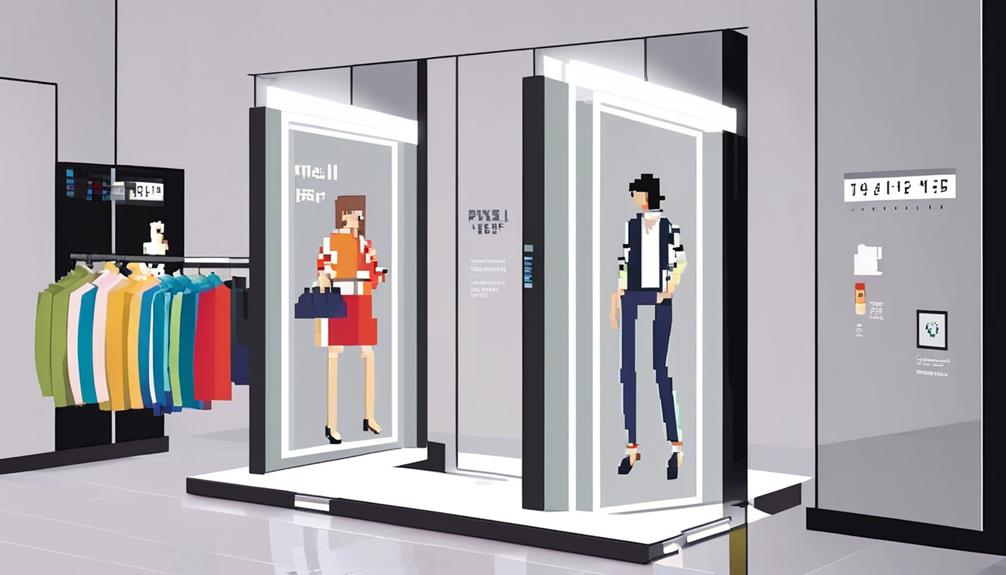
Utilizing smart devices and IoT technology, personalized shopping experiences revolutionize the retail industry by gathering and analyzing customer data to tailor shopping experiences. By harnessing the power of IoT in the retail industry, businesses can gain a deeper understanding of their customers' shopping behaviors and preferences. This enables them to provide personalized recommendations and discounts, ultimately enhancing customer satisfaction and loyalty.
With IoT, retailers can track and analyze customer data in real-time, allowing them to offer personalized shopping experiences that are tailored to each individual. This includes delivering personalized offers and promotions based on a customer's physical location within a store. By leveraging IoT technology, retailers can enhance the overall shopping experience and increase customer engagement.
Moreover, personalized shopping experiences through IoT technology can drive more conversions for businesses. By understanding customer preferences and behaviors, retailers can optimize their product offerings and inventory management to better meet customer demands. This not only improves customer satisfaction but also helps prevent overstocking or understocking of products.
In addition, IoT technology can also improve energy management in stores. By utilizing smart devices and sensors, retailers can monitor and control energy usage more efficiently, reducing costs and environmental impact. Furthermore, IoT can aid in theft prevention by providing real-time alerts and monitoring systems, ensuring the security of both customers and products.
Sensor Technologies in Retail
Sensor technologies play a crucial role in optimizing various aspects of the retail industry. With the advent of the Internet of Things (IoT), retailers are leveraging sensor technologies to enhance security, improve customer experience, and streamline operations. Here are some key sensor technologies being utilized in the retail sector:
- RFID tags: Radio Frequency Identification (RFID) tags enable retailers to track inventory in real-time, reducing stockouts and improving supply chain management. These tags can be attached to products, enabling easy identification and tracking throughout the retail ecosystem.
- Smart retail: Sensors embedded in shelves and displays can detect when products are low or out of stock, enabling retailers to replenish inventory in a timely manner. This technology ensures that customers have access to the products they need, improving customer satisfaction and loyalty.
- Customer behavior monitoring: Sensors can be used to track customer movements and behavior within the store. This data can be analyzed to understand shopping patterns, optimize store layouts, and deliver personalized promotions based on individual preferences.
- Machine learning and data analytics: Sensor-generated data, combined with machine learning algorithms, can provide valuable insights into customer behavior and preferences. Retailers can leverage this information to create targeted marketing campaigns and improve overall business performance.
- In-store smart mirrors: These mirrors use sensors to detect customer movements and display relevant product information, such as pricing, availability, and customer reviews. This technology enhances the shopping experience by providing instant access to information and recommendations.
- IoT software applications: Alongside sensors, IoT software applications play a vital role in collecting and analyzing large volumes of data generated by these sensors. These applications enable retailers to gain valuable insights, optimize operations, and make data-driven decisions.
IoT Cloud Platforms for Retail

When it comes to selecting an IoT cloud platform for retail, there are several key criteria to consider.
Retailers should evaluate the platform's scalability, flexibility, and compatibility with existing systems.
Additionally, integration challenges may arise when connecting various devices and systems, requiring careful planning and expertise.
Lastly, data security measures are crucial to protect sensitive customer information and ensure compliance with privacy regulations.
Platform Selection Criteria
The selection of an IoT cloud platform for retail requires careful consideration of various criteria, ensuring scalability, security, integration capabilities, analytics and data processing, as well as support for device management and connectivity.
- Scalability and flexibility: The platform should be able to handle the growing number of smart devices and accommodate changing IoT use cases in retail stores.
- Security features: The platform should have robust security measures in place to protect sensitive customer and business data, ensuring compliance with industry standards.
- Integration capabilities: The platform should seamlessly integrate with existing retail systems and IoT devices, enabling connected retail services and streamlining operations.
These criteria are crucial for retail stores looking to leverage IoT technology to provide a better shopping experience, improve customer experience, optimize the supply chain, and gain valuable insights from data collected through IoT devices such as RFID tags.
Selecting the right IoT cloud platform can also facilitate the development of innovative software development services for the retail industry.
Integration Challenges
Integration challenges are a formidable obstacle faced by IoT cloud platforms in the retail industry as they strive to connect diverse IoT devices and sensors to the cloud platform seamlessly. These challenges arise due to the need for integration with existing retail frameworks and systems, and the complexity of connecting various IoT devices and sensors. Ensuring compatibility and smooth communication between different IoT devices and the cloud platform is crucial. Scalability issues also emerge as the volume of data and connected devices increases, posing additional challenges for IoT cloud platforms. Overcoming these challenges is essential to harness the full potential of IoT in the retail sector, enabling use cases such as supply chain optimization, retail analytics, and enhanced customer experiences. The following table provides an overview of some key integration challenges faced by IoT cloud platforms in the retail industry:
| Integration Challenges | Solutions |
|---|---|
| Compatibility issues | Standardize protocols and interfaces |
| Legacy system integration | Develop adapters and connectors |
| Scalability | Optimize data processing and storage |
| Communication reliability | Implement robust network architecture |
Data Security Measures
To ensure the secure operation of IoT cloud platforms in the retail industry, robust data security measures are implemented.
The implementation of data encryption and authentication protocols ensures that customer data is protected and cannot be accessed by unauthorized individuals.
Access control mechanisms are enforced to restrict access to the IoT cloud platform only to authorized personnel, preventing any manipulation or misuse of data.
Additionally, continuous security monitoring and threat detection systems are put in place to identify and respond to potential security breaches in real-time.
Regular security audits and compliance checks are conducted to maintain the integrity and confidentiality of data stored on the IoT cloud platform.
Data segregation and isolation techniques are utilized to prevent unauthorized access and data leakage within the platform.
Enhanced Supply Chain Management
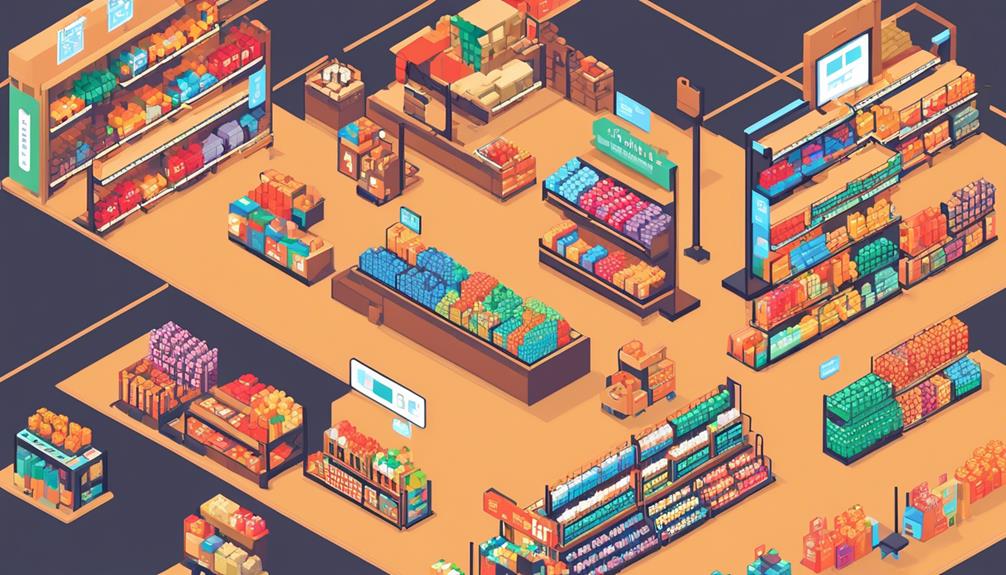
Enhanced supply chain management in the retail industry leverages the power of IoT technology to optimize product tracking and improve operational efficiency. By implementing IoT in retail, retailers can take advantage of connected retail services, such as RFID tags and GPS sensors, to enable real-time tracking of products from manufacturing to store shelves. This level of visibility enables retailers to have better control over their inventory, reducing the risk of stockouts and improving overall supply chain efficiency.
IoT systems also play a crucial role in improving the transportation and delivery of perishable goods. With the help of IoT devices, such as temperature sensors and monitoring systems, retailers can ensure that perishable items are transported and stored under optimal conditions to prevent losses. This not only helps in reducing waste but also ensures that customers receive fresh and high-quality products.
Furthermore, implementing IoT in retail enables advanced automation, which streamlines routine tasks and frees up employees for more strategic activities. For instance, IoT devices can automate inventory management, replenishment, and pricing, allowing employees to focus on enhancing the customer experience and driving sales.
The benefits of enhanced supply chain management through IoT implementation are not limited to operational efficiency. IoT systems enable retailers to gather and analyze vast amounts of data on customer behavior, store performance, and inventory. This data can be used to make intelligent business decisions, personalize offerings, and improve the overall customer experience.
Retail Automation Systems
Retail automation systems leverage IoT technology to streamline operational processes and enhance the overall shopping experience for customers. These systems utilize smart devices and connected retail services to automate routine tasks, reducing manual labor and improving service.
Here are three key aspects of retail automation systems:
- Optimized Employee Tasks: IoT-enabled devices in retail automation can assist in optimizing employee tasks and improving people-to-people interactions. For example, employees can use handheld devices connected to the IoT network to access real-time inventory information, locate products, and provide personalized recommendations to customers. This not only saves time but also enhances the level of customer service.
- Enhanced Customer Experience: Retail automation systems can enhance the offline shopping experience by utilizing IoT technology. For instance, IoT-enabled devices such as interactive kiosks or digital signage can provide customers with information about product details, promotions, or even suggest complementary items based on their preferences. Additionally, RFID tags can be used to enable seamless self-checkout experiences, reducing waiting times at the checkout counters.
- Data-driven Insights: By employing IoT, retailers can gather and process valuable information, providing insights into buyer actions and behavior. For instance, IoT sensors can collect data on customer footfall, product interactions, and buying patterns. This data can be analyzed to optimize store layouts, product placements, and inventory management. Furthermore, IoT in retail automation systems contributes to improved sales, inventory tracking, and enhanced loss prevention.
Advanced Analytics Capabilities
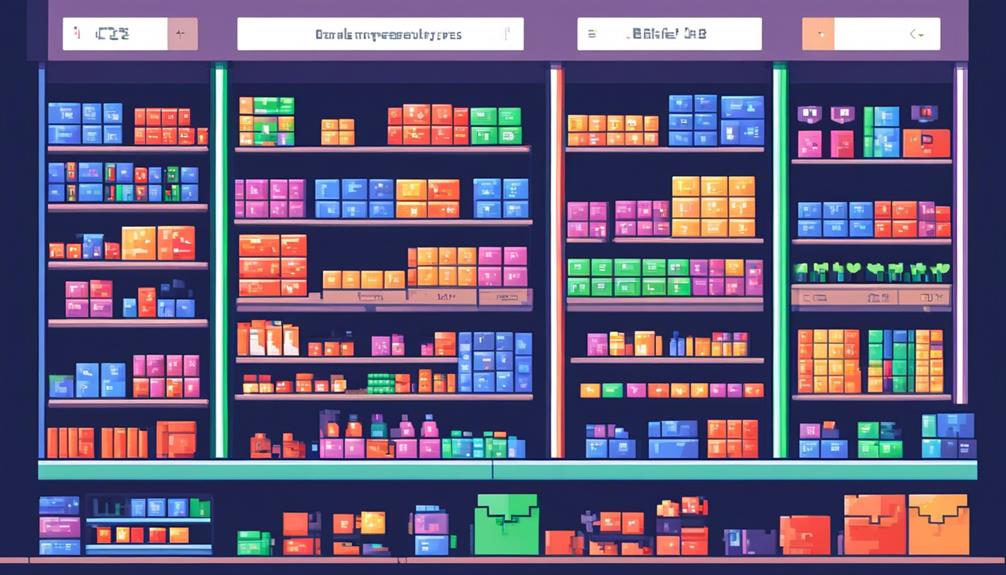
With the integration of advanced analytics capabilities, retailers can harness the power of data to gain valuable insights into customer behavior, store performance, and inventory management. By using IoT and connected retail services, retailers can gather and analyze data from various sources, such as point-of-sale systems, customer loyalty programs, and RFID tags. This data can then be processed and analyzed using advanced analytics techniques to generate actionable insights that drive intelligent business decisions.
One area where advanced analytics can greatly enhance the customer experience is through personalized marketing. By analyzing customer data, retailers can gain a deeper understanding of individual preferences and purchasing patterns. This enables them to deliver targeted promotions and recommendations to customers, improving customer satisfaction and driving sales.
In addition to customer behavior, advanced analytics can also help retailers improve their supply chain and inventory management. By analyzing historical sales data and market trends, retailers can optimize their inventory levels, ensuring that products are always available when customers need them. This can reduce costs associated with overstocking or understocking and improve overall store performance.
Furthermore, advanced analytics can provide retailers with insights into store performance metrics, such as foot traffic, conversion rates, and average transaction value. By analyzing these metrics, retailers can identify areas for improvement and take proactive measures to enhance the in-store experience for customers.
Frequently Asked Questions
What Are the 5 Applications of Iot in Retail?
The five applications of IoT in retail include:
- Smart inventory management: With IoT technology, retailers can implement smart shelves for efficient inventory management.
- Customer analytics: Retailers can utilize customer data analytics to gain insights into consumer behavior.
- Supply chain optimization: IoT enables retailers to optimize their supply chain processes for improved efficiency.
- Personalized marketing: Retailers can personalize marketing campaigns based on customer preferences.
- Enhanced customer experience: IoT technology allows retailers to enhance the overall customer experience through real-time analytics and personalized recommendations.
These applications contribute to increased operational efficiency and customer satisfaction in the retail industry.
How Can Iot Be Used in the Retail Industry?
IoT is revolutionizing the retail industry by enhancing customer experience, improving inventory management, and optimizing supply chain operations.
It enables personalized marketing campaigns, streamlines checkout processes, and enhances store security. Implementing smart pricing strategies and smart shelves further enhance the retail experience.
IoT also enables enhanced product tracking and tracing, improving energy efficiency in retail stores. With its technical precision and analytical capabilities, IoT is redefining the way retailers operate, ensuring a seamless and efficient shopping experience for customers.
What Are the Iot Hardware Products?
IoT hardware products encompass a wide range of options for retail implementation. Popular IoT devices include smart shelves, wearables, and smart devices like smartphones. Various types of IoT sensors can be used for inventory management, customer tracking, and checkout automation.
Additionally, IoT solutions can be applied to supply chain management, enhancing efficiency and visibility. Wearable IoT devices play a significant role in gathering customer engagement data.
What Are the Components of Iot Implementation?
IoT implementation involves several key components that are crucial for its success. These include:
- IoT sensors for collecting data
- Various connectivity options for seamless communication
- Data analytics for extracting insights
- Cloud platforms for storage and processing
- Edge computing for real-time analysis
- Device management for monitoring and control
- Security measures to protect data
- Power management for efficient operation
- Integration with existing systems for seamless integration
- Scalability considerations for future growth
Each of these components plays a vital role in ensuring a successful IoT implementation across various industries, including retail.
